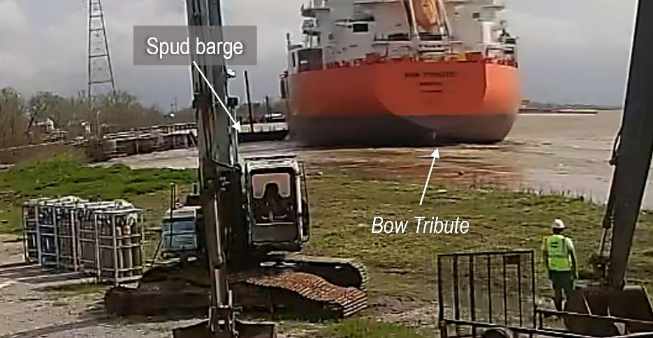(WASHINGTON) — The decision to overtake a tow in a large river bend occupied by multiple vessels during high-water conditions led to the grounding of a tanker and contact with river intake fender systems in New Orleans, the National Transportation Safety Board (NTSB) said Thursday.
Marine Investigation Report 22/11 details the NTSB’s investigation into the March 16, 2021, grounding of the tanker Bow Tribute and subsequent contact with the fender systems protecting two river intakes owned by the city’s sewerage and water board. Bow Tribute was transiting downbound in the Lower Mississippi River when the vessel grounded while attempting to overtake a two-barge tow in a river bend. No injuries or pollution were reported. Damage totaled over $1.9 million, including $986,400 in damage to the vessel and $926,100 in damage to the fender systems.

On board Bow Tribute was a New Orleans-Baton Rouge Steamship Pilots Association (NOBRA) pilot and a 27-person crew. Ahead of the tanker, also traveling downbound, was the towboat American Way pushing two empty barges with a crew of four. The two pilots agreed the tanker would overtake the tow at Nine Mile Point, within Carrollton Bend. There was additional traffic in the area of American Way, including the downbound towboat Capt. JW Banta pushing two barges and the upbound bulk carrier Red Cosmos.
While rounding Nine Mile Point ahead of Bow Tribute, the American Way tow began to slide in the bend and into the path of the overtaking Bow Tribute. American Way’s pilot could not maintain the tow’s position in the center of the river, nor power or steer it out of the slide in sufficient time to allow space for Bow Tribute, which was traveling at double the speed of American Way.
As the distance between the vessels continued narrowing, the NOBRA pilot steered the tanker clear of American Way. The NOBRA pilot on Bow Tribute told investigators that he kept the vessel near the shoreline because he could no longer see American Way under Bow Tribute’s starboard bow. Shortly after, Bow Tribute struck sequentially two spud barges that were part of a fender system protecting the river intake pipes.
The NTSB determined the probable cause was the pilot’s decision to overtake a tow in a large river bend occupied by multiple vessels during high-river conditions with a strong following current. Contributing to the grounding was the ineffective communication between the pilot of Bow Tribute and the pilot of American Way regarding where the overtaking maneuver would occur.
“Clear, effective, and unambiguous radio communications should be used, especially during high traffic and dynamic conditions such as overtaking in a bend,” the report said.
– National Transportation Safety Board
